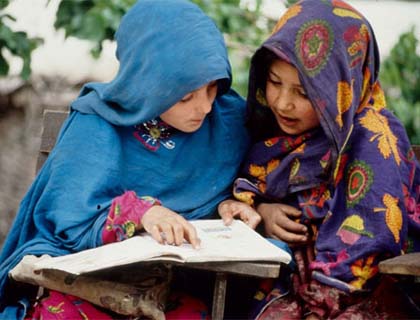FATA is the most horrible place for women on our planet where they do live in dark ages. Susceptible to social and psychological poverty, women in Federally Administrative Tribal Areas (FATA) have entitlement to nothing significant under 'Pakhtun code of honor.' With the arrival of Taliban, the situation is miserable beyond description. Sufferings of FATA women can be analyzed from various perspectives. At the very birth of a female kid, her father or elder develops a sense of potential threat to his honor that continues to haunt that innocent soul until she bids farewell to this world. She is kept deprived of education. Rarely in Waziristan, does one dare to send her female kid to school even for basic education. There are exceptionally few females who luckily reach universities for higher education. In fact they belong to salaried class of FATA. However, education does not bring light to their lives. Eventually they also suffer suffocating customs of their native areas.
The worst phase of her life begins with her adulthood. There are authentic narratives that even a gaze of outer world either through climbing the roof or entrance gate became the justification for killing them in the name of honor. Honor has a very bizarre understanding among tribal people, wrapped in religious colors. Then comes the time of marriage. They can never marry of their choice. The custom of Walwar is profound. Paying hefty Walwar, a groom of inferior characteristics can get a charming bride.
Denial of right to marriage is ingrained in customary laws and not even that, sometimes women are given in Sawara, a custom to settle disputes by forcibly marrying a female with the male of victim's family. Besides this, marriageable age is not usually considered. Many underage girls are married to aged men either for Walwar or for Sawara.
The fate of lovers is death. If a woman is suspected of having relation with some man, the male relatives of that woman first of all kill her and then the man in order to mitigate the sense of dishonor caused to them by this relation. A United Nations High Commission for Refugees (UNHCR) report reveals that the incidents of honor killings in FATA are not reported due to "political pressure and Pashtun patriarchical ethos, which is based on upholding tribal honor." Human Rights Watch documents say, "The tribal justice system makes it incumbent upon husbands and male relatives to restore family honor damaged by allegations of a woman's sexual misdeed, usually by killing the woman and her alleged lover."
Similarly, women in FATA have almost no entitlement to inheritance. They are at the mercy of males always. They have no say in the affairs of family and also become the victims of violence at home. There was an incident in South Waziristan where a woman's husband went abroad for a year. She did not have bath for 8 months. Once while washing cloths at a nearest spring she took bath. On her return to home, in-laws suspected her of having illicit relationship with someone. Her husband was informed aboard. Unfortunately, he divorced her on phone. Apparently, it appears to be a fictitious story however, may not be true, it depicts the rigidity of system.
The hardships of FATA women are immense. They bear maltreatment of males, even they serve them with their best possible. An average woman spends ten years of her life in gathering firewood and bushes from mountains in Waziristan and five years in bringing drinking water from nearest spring. Farming is not that much established in tribal agencies, however, women participate in subsistence farming activities usually with their males.
Coming to health issues, women usually need more medical care then men as they bring new lives to this world not to speak of their vulnerabilities to diseases. In FATA, the access to health facilities is extremely low due to non-availability of health facilities. Child bearing takes place at the mercy of nature or quakes. Nutrition remains the remote priority. Though it is difficult to bring the whole population of FATA in the health net due to scattered pattern of settlements and the difficulties of moving in unfriendly terrain however the establishment of health facilities in major villages run by locals will certainly be helpful.
Sufferings of women can be traced to customs and culture of tribal system prevailing in FATA and resultant backwardness. Women are handicapped; they cannot break the cruel encirclement of tribal rigidity. Neither outsiders can help them breath fresh.
Frontier regions of FATA, despite having a fair literacy rate in Pakistani context, do not represent significant differences with tribal agencies. F R Bannu is perhaps the most vibrant frontier region with respect to women education. Unfortunately, the "gherat bound" mind set is similar.
To conclude, the worst victims of militancy stricken FATA are women. They constitute the half of population. All stakeholders in Pakistani tribal areas advocate all inclusive reforms. The government and NGOs in particular have tried to address the plight of women in indirect ways. A lot was invested in establishing institutional structures for vocational training and education. However, it did not make any difference. There is a need to understand the nature of problem first.
Any plan for the amelioration of plight of women in FATA must address the roots. Until, the males of tribal society undergo change, women will continue to suffer. It is basically the approach of males towards women folks that strengthens the tribal lines of limitations on women rights. The government should introduce laws to protect women and provide facilities that enhance the capacity of women. However, empowerment is a distant dream for women in FATA. It will take time to change things that have centuries old foundations.

